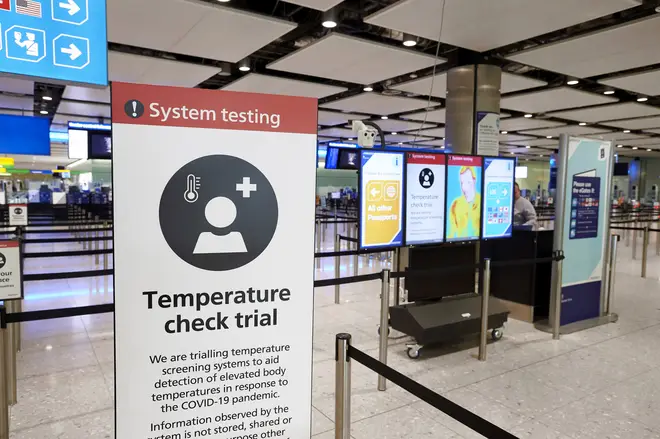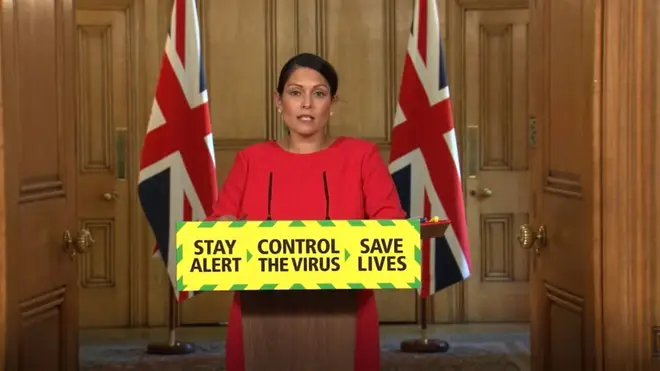
Ali Miraj 1pm - 4pm
22 May 2020, 22:23

The Home Secretary has announced all those arriving into the UK will have to go into self-isolation for 14 days, but who is exempt from these measures?
Priti Patel announced the latest government rules on quarantines on Friday, saying people must take steps to "guard against imported cases" of Covid-19.
From 8 June, anyone - except for those outlined in government guidance - who arrives in the UK must go into two weeks of self-isolation to see if they develop symptoms of coronavirus.
Those who flout the latest rules could be fined up to £1,000.
People who are exempt from measures will include people travelling from the Common Travel Area - the Republic of Ireland, the Channel Islands and the Isle of Man.
Agricultural workers who travel to the UK are permitted to start work immediately, but are asked to self-isolate on the farm where they are employed. They are permitted to mix with their fellow workers.
READ MORE: Travellers arriving into UK must self-isolate for 14 days from 8 June

- Lorry drivers and their passengers
- People travelling through the UK en route to another country.
- Someone travelling for pre-arranged healthcare treatment, or those accompanying a child for the same reason.
- Registered health or care professional travelling to the UK to work - even if this is not related to
-Airplane inspectors
- Civil aviation inspectors engaged on inspection duties
- Anyone working for the Channel Tunnel
- Nuclear power workers
- Workers engaged in essential or emergency works, related to water supplies and sewerage services
- Workers engaged in essential or emergency works, including those carried out by specialist rail maintenance technicians employed on the national rail infrastructure as part of a specialist team with Network Rail
-Emergency construction workers
- Seamen, masters, ship inspectors
- Crew, as defined in paragraph 1 of Schedule 1 to the Air Navigation Order 2016(h), where such crew have travelled to the UK in the course of their work
- Agency inspector
- An inspector from the Organisation for the Prohibition of Chemical Weapons, a specialist aerospace engineer, or a specialist aerospace worker
- A person engaged in operational, maintenance or safety activities of a downstream oil facility that has a capacity in excess of 20,000 tonnes
- A postal worker involved in the transport of mail into and out of the UK
- A person involved in essential maintenance and repair of data infrastructure required to reduce and resolve outages, or in the provision of goods and services to support these activities
- An information technology or telecommunications professional whose expertise is required to provide an essential or emergency response to threats and incidents relating to the security of any network and information system and ensure the continued operation of any network and information system
- A person who is engaged in urgent or essential work on electronic communications networks
- A person who is engaged in urgent or essential work for the BBC's broadcasting transmission network and services
- Agricultural worker 's can start work immediately but must self-isolate on the farm. However, they may mix with fellow workers
- Members of diplomatic missions and consular posts in the United Kingdom, officers, servants or representatives of international organisations where their head of mission or equivalent has certified that their work is essential
- Crown servants or government contractors returning to the United Kingdom who are either: required to undertake policing or essential government work in the United Kingdom within 14 days of their arrival, have been undertaking policing or essential government work outside of the United Kingdom but are required to return temporarily, after which they will depart to conduct policing or essential government work outside the United Kingdom. Essential government work includes, in particular, work related to national security and immigration, the coronavirus disease and any other crisis response, and international negotiations
- International prison escorts
- Defence personnel and contractors doing work necessary for the delivery of essential Defence activities, including Visiting Forces and NATO
- An official required to work on essential border security duties
- A person who resides in the UK and who pursues an activity as an employed or self-employed person in another country to which they usually go at least once a week